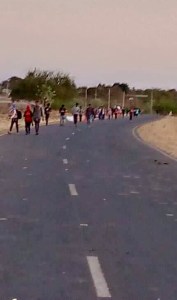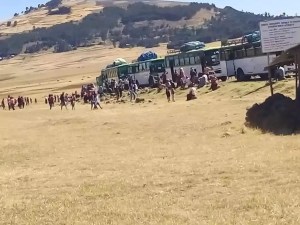Hundreds of Eritreans who had fled from refugee camps to escape the war in Tigray have been forced back after seeking safety in Addis Ababa.
Ten busloads of Eritrean refugees - who had fled repression in their home country only to find themselves in the centre of the fighting in Tigray - have been returned to the camp at Adi Harush under armed guard.
The UN Refugee Agency, which was alerted to their plight was unable to halt their enforced return.
A statement by the UN Refugee Commissioner, Filippo Grandi on on 11th December expressed concern at their plight:
“I am deeply alarmed about the safety and well-being of Eritrean refugees in Ethiopia, who have been caught in the conflict in the Tigray region. To find safety and basic means of survival, many Eritrean refugees are fleeing the camps to locations both within Tigray and other regions of Ethiopia. We have met with some who managed to reach Addis Ababa. It is vital that Eritrean refugees be able to move to safe locations, and receive protection and assistance wherever possible, including outside of Tigray, given the traumatic events they report to have witnessed or survived.”
The UNHCR said:
“We received alarming messages from Eritreans living abroad and when we looked into them, ascertained that several hundred refugees had been put on buses this morning to be returned to the Tigray region. We had not been informed in advance by the Government or any other authorities or partners of a planned relocation of refugees.
Given the traumatic events to which refugees say they were exposed in Tigray, we believe Eritrean refugees should have to opportunity to receive protection and assistance outside of the region, in accordance with the Government of Ethiopia’s Refugee Proclamation, the out of camp policy and other relevant national and international laws. UNHCR has advocated with the Government for access to jointly identify and respond to the needs of Eritrean refugees who have moved out of the camps in the Tigray region, including to the Amhara region and Addis Ababa.”
After a lengthy journey the buses arrived at Adi Harush and Mai Ayne camps, offloaded the refugees and left.
Federal troops had cleared the area of Tigrayan militia prior to their arrival.
The refugees were provided very little to eat on the trip and say that there is no security, food or medical supplies in the camps.
They are afraid that Eritrean troops, allied to the Ethiopian government, will arrive and force them back to Eritrea.
The refugees hope that the UNHCR and other aid agencies will soon be able to assist at the camps.
The flight from the war-zone
 On 7th December we published a story about the attempt by hundreds of Eritreans to escape the fighting in Tigray.
On 7th December we published a story about the attempt by hundreds of Eritreans to escape the fighting in Tigray.
This is what was reported:
“Eritrean refugees are pouring out of the UN camps in which they have been living, to escape being engulfed in the fighting in Tigray.
They have been targeted by Eritrean forces who are fighting alongside the Ethiopian Federal forces. Eritrean refugees are reported to have been forcibly returned to Eritrea, or even put into uniform and sent to the frontline.
Reports from the Adi Harush refugee camp says that many fear for their safety. They are staying up all night, to try to prevent attacks and abductions from the camp.
Adi Harush is the most southerly of the camps in Tigray and was home to over 32,000 Eritrean refugees before the fighting, who fled from their country to escape its repressive conditions.”
Seized and detained in Addis
The next that we heard was that even those who had reached the relative safety of Addis Ababa were being rounded up by the authorities.
“Arbi Harnet (Freedom Friday) has received disturbing information from Addis Ababa the capital of Ethiopia.
The news relates to around 300 Eritrean refugees who fled the fighting in Tigray.
Some were working in various capacities in Tigray region and some are from the refugee camps that are home to thousands of Eritrean refugees.
Once in Addis they were detained at the offices of International Organisation for Migration in the area of Bole in Addis and have been threatened with forced return to Eritrea.
The process is presented as voluntary return and they are being held in the voluntary return registration centre of IOM.
In a message smuggled out of the centre the refugees have asked for help in stopping this injustice that is about to be perpetrated against them. They asked for pressure on IOM to not be complicit to this crime of returning them to the brutal regime they had fled from.”
The International Organisation for Migration was furious that its offices had been used in this way, without their permission.
Forced onto buses and heading back to Tigray
Surrounded by Ethiopian troops, the Eritrean refugees were forced onto ten busses to make the long  journey back to the Tigray camps.
journey back to the Tigray camps.
We received photographs of the refugees taking a short break along the way.
Now they are back at Adi Harush - hoping against hope that they will be safe and that help will arrive soon.
They are refugees registered with the UNHCR, which is responsible for their security.
So where is the UN and other INTERNSTIONAL HUMANTERIAN organization of the world ? Will they be writing stories after all these human being evaporate ???
I wonder